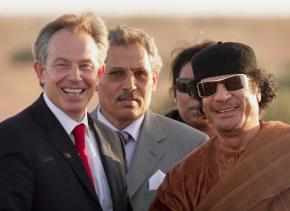More shameless lies about Iraq
Is there no lie about the 10-year-old war on Iraq that's too transparent or immoral for Britain's former prime minister to utter it, asks ?
DEFENDING THE invasion of Iraq in 2003, Tony Blair recently cited Saddam Hussein's use of chemical weapons against his own people as an example of the fundamental evil which the invasion was designed to extirpate.
The reference was to events in the town of Halabja, population 60,000, on March 16, 1988. Halabja had been captured the previous day by the Patriotic Union of Kurdistan, at that time in alliance with Tehran in the Iran-Iraq War. The response of the Baghdad regime was swift and merciless.
At dawn on March 16, Iraqi bombers sharked across the sky, dropping chemical bombs from MiGs supplied by Russia and Mirages supplied by France. The town was smothered in a fog of death.
The first journalists to arrive in the aftermath were from Iran. Their pictures were flashed around the world, to revolt the conscience of hundreds of millions of people. One observer described the scene: "The streets were strewn with corpses. People had been killed instantaneously by chemicals in the midst of the ordinary acts of everyday life. Babies still sucked their mothers' breasts...In the space of a few hours, 5,000 people had died."

By any definition, this was a crime against humanity. Had it been advanced at the time as a casus belli, many with no stomach for war of any kind might have backed an invasion.
But Saddam was able to shrug off any possibility of an outraged world retaliating. And he was right. Iraq was seen at the time as a secular bulwark against the radical Islam of the Ayatollahs. Five months after the massacre, the UN sub-committee on human rights rejected--by an 11-to-8 vote--a resolution condemning the dictatorship for human rights violations.
In the U.S., a Senate resolution calling for sanctions against Iraq was vetoed by George Bush Sr. Bush then authorized a billion-dollar loan to Saddam to build a chemical plant.
Britain's response to Halabja and a myriad of other crimes committed by Saddam emerged in the course of the Scott Inquiry in 1992 into the collapse of the trial of four directors of machine-tools company Matrix Churchill, which had been selling Saddam equipment with a potential for military use in breach of sanctions imposed in the wake of the Iraqi invasion of Kuwait in 1990.
The four men's defense was that the company had secretly been encouraged by John Major's Tory Party government to continue shipping the equipment. The trial collapsed when the government--citing "the public interest"--refused to hand over documents which the defendants claimed would back up their version of events.
(It is worth noting in passing that it was the invasion of oil-rich Kuwait, not his slaughter of the Kurds, which prompted sanctions and a 180-degree turn in attitudes towards Saddam; Bush was now referring to him as "the new Hitler.")
THERE IS not a word about any of this from Blair, as he offers the Halabja massacre in justification of the invasion. But then, Blair, morally inert, has never allowed trivia like truth to stand in the way of war.
We know from the Chilcot Inquiry into the war that Downing Street chief of staff Jonathan Powell wrote on September 17, 2002, to Blair's top sidekick, Alastair Campbell, about the foreword to a dossier Blair was preparing for presentation to parliament. "In the penultimate para, you need to make it clear that Saddam could not attack us at the moment," he wrote. "The thesis is he would be a threat to the UK in the future if we do not check him."
Just a week later, Blair stood up in the Commons and told MPs that Saddam Hussein posed "a current and serious threat to the UK national interest."
Other spurious claims in the dossier included that Iraq had formulated "military plans for the use of chemical and biological weapons...Some of these weapons are deployable within 45 minutes of an order to use them." Thus, the Evening Standard front-page splash on September 24: "45 minutes from attack." The Star followed up next morning: "45 minutes from a chemical war." The front page of The Sun warned: "Brits 45 mins from doom."
Blair is a stranger to the truth. His repellent smarm, as he repeats on television today the barefaced lies he used to lure his country into war, compounds the sheer offensiveness of his presence in our midst.
In September last year, Bishop Desmond Tutu refused to share a platform with Blair at a gathering in Johannesburg, suggesting instead that "in a consistent world," Bush and Blair "should be treading the same path as some of their African and Asian peers, who have been made to answer for their actions at (the International Criminal Court in) the Hague."
Sound man, that Tutu.
First published in the Belfast Telegraph.


